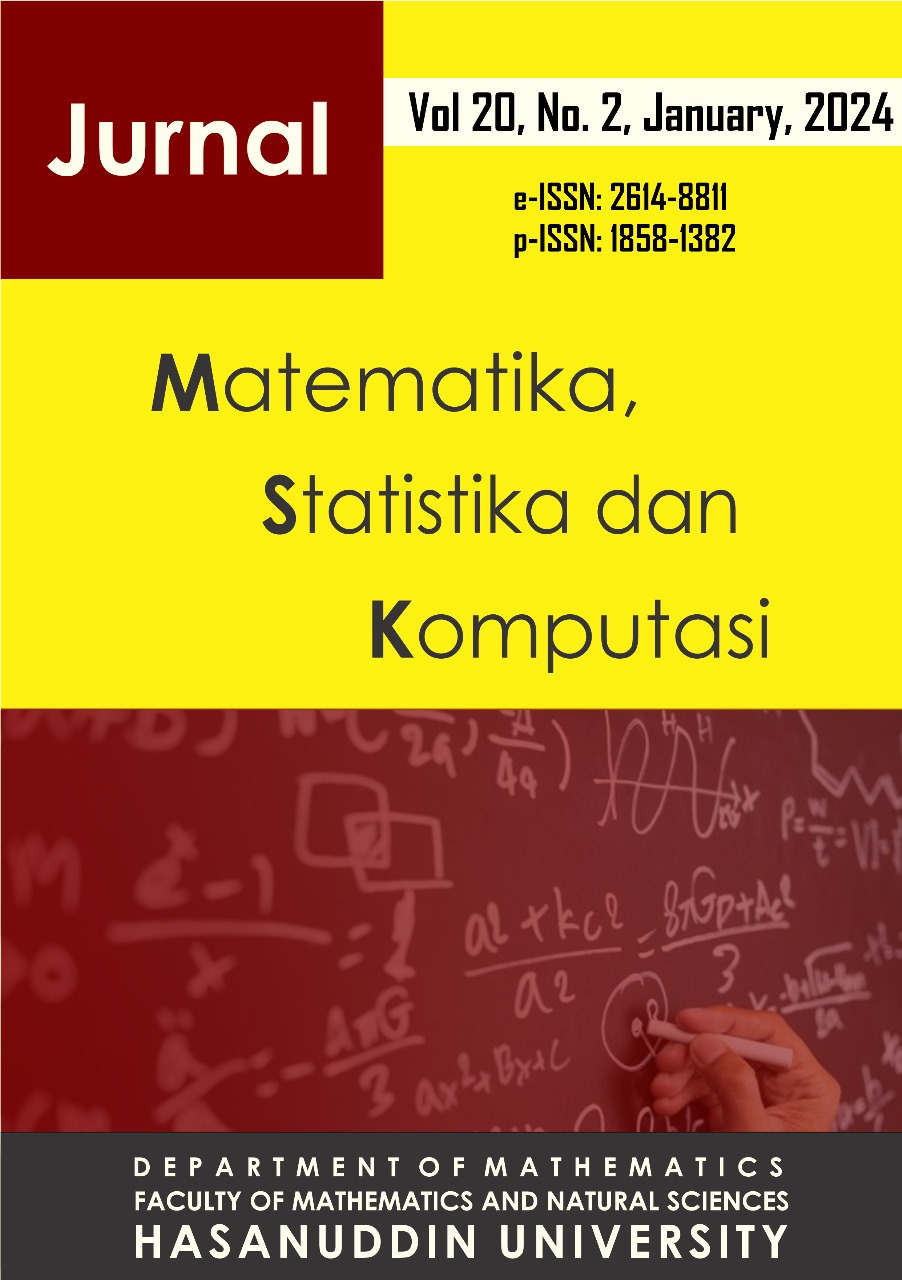K-Means Classification Analysis of Concept Understanding and Self-efficacy: Exploring the Relationship in an Educational Context
DOI:
https://doi.org/10.20956/j.v20i2.32099Keywords:
K-Means, Concept Understanding, Self-efficacyAbstract
Concept understanding and self-efficacy are two important aspects of mathematics learning that are interrelated. However, there is still debate about the relationship between these two aspects in the context of mathematics learning. Therefore, this study was conducted to analyze the classification of concept understanding and self-efficacy using K-means clustering with a sample of grade VIII students from three selected schools in Wolowaru District and Kelimutu District, Ende Regency, NTT. Data were collected through concept understanding test and self-efficacy questionnaire. The results showed that students' concept understanding and self-efficacy belonged to the medium and low classes. However, there was a practically insignificant correlation between the two aspects. The implication is the importance of developing learning strategies that can improve students' concept understanding and self-efficacy in the context of mathematics education.
References
Astuti, V. D., Muthmainnah, R. N. & Rosiyanti, H., 2021. Pengembangan Media Pembelajaran Aplikasi Pokamath Pada Materi Aljabar Kelas VII. Fibbonaci: Jurnal Pendidikan Matematika dan Matematika, Vol. 7, No. 1, 1-10.
Bwalya, A. & Rutegwa, M., 2023. Technological Pedagogical Content Knowledge Self-efficacy of Pre-service Science and Mathematics Teachers: A Comparative Study Between Two Zambian Universities. EURASIA: Journal of Mathematics, Science and Technology Education, Vol. 19, No. 2, 1-14.
Dewi, C. K., 2020. Analisis Self Efficacy dan Hubungannya Terhadap Pemahaman Konsep Fisika Siswa SMP. Skripsi. Universitas Islam Negeri.
Farihah, F. 2014. Pengaruh Self Efficacy Terhadap Stres Mahasiswa Angkatan 2010 yang Menyusun Skripsi Fakultas Psikologi UIN Maulana Malik Ibrahim Malang. Tesis. UIN Maulana Malik Ibrahim.
Hardianto, G., Erlamsyah & Nurfarhanah., 2014. Hubungan Antara Self-efficacy Akademik dengan Hasil Belajar Siswa. Konselor, Vol. 3, No. 1, 22-27
Kosim, N. & Syah, L. 2016. Potensi Dasar Manusia Menurut Ibnu Taimiyah dan Implikasinya dalam Pendidikan Islam. Jurnal Qathruna, Vol. 3 No. 1, 63-97.
Kuzu, T. E., 2022. Pre-algebraic Aspects in Arithmetic Strategies-The Generalization and Conceptual Understanding of the ‘Auxiliary Task’. EURASIA: Journal of Mathematics, Science and Technology Education, Vol. 18, No. 2, 1-17.
Mawaddah, S. & Maryanti, R. 2016. Kemampuan Pemahaman Konsep Matematis Siswa SMP dalam Pembelajaran Menggunakan Model Penemuan Terbimbing (Discovery Learning). EDU-MAT: Jurnal Pendidikan Matematika, Vol. 4, No. 1, 76-85.
Nurwahyuni., 2021. Identifikasi Pemahaman Konsep dan Self Efficacy Siswa Kelas X SMAN 4 Palu Pada Materi Struktur Atom dan Sistem Periodik Unsur. Skripsi. Universitas Tadulako.
Pertiwi, N. G., 2015. Pengaruh Self Efficacy Terhadap Hasil Belajar Pada Siswa Kelas V Sekolah Dasar Daerah Kecamatan Cilacap Selatan Kabupaten Cilacap. Skripsi. Universitas Negeri Semarang.
Saputra, I Kadek F., 2020. Pengembangan Instrumen Skala Self-Efficacy Siswa Sekolah Menengah Kejuruan (SMK). Tesis. Universitas Pendidikan Ganesha.
Sevinka, A.Y., Dantes, N. & Arum, D., 2023. Pengembangan Instrumen Skala General Self Efficacy Pada Siswa Sekolah Menengah Pertama. Jurnal EDUCATIO: Jurnal Pendidikan Indonesia, Vol. 9, No. 1, 410-415.
Umairi, K. S. S. A., Salleh, U. K. M. & Zulnaidi, H., 2023. Adaptation of the Source of the Mathematics Self-Efficacy Scale for Oman: A Validation Study. EURASIA: Journal of Mathematics, Science and Technology Education, Vol. 19, No. 9, 1-15
Rahmi, Febriana, R. & Putri, G. E., 2020. Pengaruh Self-Efficacy Terhadap Pemahaman Konsep Matematika Pada Pembelajaran Model Discovery Learning. Edumatica: Jurnal Pendidikan Matematika, Vol. 10, No. 1, 27-34.
Downloads
Published
How to Cite
Issue
Section
License
Copyright (c) 2023 Author and publisher

This work is licensed under a Creative Commons Attribution 4.0 International License.

This work is licensed under a Creative Commons Attribution 4.0 International License.
Jurnal Matematika, Statistika dan Komputasi is an Open Access journal, all articles are distributed under the terms of the Creative Commons Attribution License, allowing third parties to copy and redistribute the material in any medium or format, transform, and build upon the material, provided the original work is properly cited and states its license. This license allows authors and readers to use all articles, data sets, graphics and appendices in data mining applications, search engines, web sites, blogs and other platforms by providing appropriate reference.







